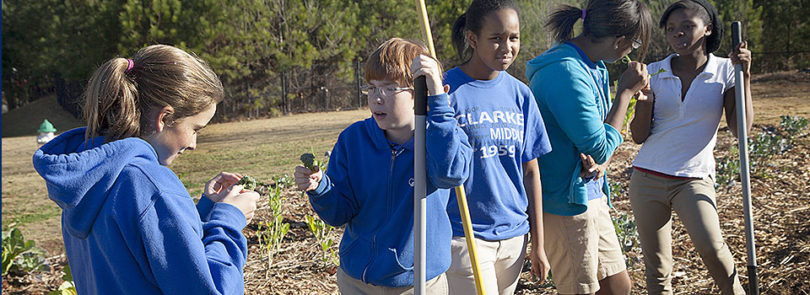Middle school students in Athens are learning to grow their own vegetables in a community garden created as a service-learning project led by University of Georgia horticulture professor David Berle.
With assistance from the Athens Area Master Gardener Association and the Athens Land Trust, Berle and UGA service-learning students have enhanced the thriving agricultural education program at Clarke Middle School. The project features a greenhouse and a freshly turned plot, about 50 feet by 100 feet, where students plant carrots, radishes, collards and other vegetables.
The purpose of the project is to instill in middle school students a greater understanding of how food is grown, what foods offer the best nutrition and how knowledge of horticulture can help serve themselves and their community. Last year, a local food bank benefited from nearly a ton of fresh produce grown at CMS.
“The garden has two goals,” Berle said. “One, to teach the kids how to grow produce; the second, to try to get fresh vegetables into the kids’ diet, either by sending it home with them or funneling it through the cafeteria. There is going to be a learning curve on everyone’s part, starting with doing a better job of growing enough of any one item to provide for the needs of the cafeteria.”
This will be a challenge for Berle and his UGA students.
The service-learning project with CMS began two years ago as Berle sought to expand service-learning opportunities for his students. Berle and CMS Principal Tad McMillan talked about possible projects uniting UGA and CMS. With the help of the Office of Service-Learning, funding for an AmeriCorps VISTA position has been secured that will strengthen the garden program at both CMS and neighboring Alps Road Elementary School. AmeriCorps VISTA is a national service program designed specifically to fight poverty by providing one year of funding for a full-time position.
“David has been absolutely instrumental in the success of the garden,” said Cheryl Hinson, CMS agricultural science teacher. “He came out with UGA graduate student Zachary Saylor, tilled the soil and plowed the area. He suggested what plants to plant for the warmer and the cooler months. He also provided plants for our greenhouse.
“Childhood obesity is such a problem,” Hinson continued. “We hope that by learning about foods, we’re promoting healthy eating. We’re helping students recognize and appreciate healthy foods.”
Hinson said her students are learning from the garden.
“They harvested and made a salad,” she said. “They love to ask if they can come out and work in the garden. It gives them a chance to come out of the classroom, but they are also learning about organic foods and where food comes from. They realize we can grow our own food.”
The CMS project presents a great learning benefit to UGA students as well as CMS and Alps Elementary students, Berle said.
“There is an opportunity to engage both college and K-8 students in a wide range of projects related to gardening, food production, nutrition, health and science in a community that encompasses many families in need,” Berle said. “The CMS/Alps Elementary site, in particular, represents a unique combination of two schools, which could also lead to joint projects and opportunities for middle school children to work with the younger kids.”
Berle said college students appreciate the opportunity to serve the local community, especially when they can apply what they learn in class in hands-on situations. CMS fits the bill perfectly, he said.
“There is a great opportunity to work over a period of time, in one place, close to campus, in the heart of one community with a large percentage of families in need,” Berle said. “In addition to land available to launch projects on, both schools have actively interested principals and teachers along with growing agriscience programs that are supported in the form of a greenhouse and funding for horticulture projects.”
Berle brings to the project a rich history of working with schools in the area. For several years he worked with Alps Road Elementary students on gardening projects. It was during this time that Berle was in discussions with organizations like the Athens Land Trust about doing more gardening/food production work in the community.
“Schools are a good place to do this,” he said. “In the case of CMS, there is a lot of land around the two schools. CMS’s principal expressed an interest in such projects in the past and since the school is close to UGA geographically, I can easily get students to go there for future class projects.”
Berle said service-learning has become a major component of his teaching program. Students in his classes participate in a variety of community-service projects, many as an integral component of their learning experience.
“Probably the most significant thing that has happened to me has been my involvement in the Office of Service-Learning,” Berle said. “I consider the service-learning work I have done to be my greatest professional achievement.”




